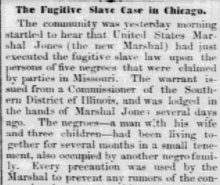The Fugitive Slave Case in Chicago.
The community was yesterday morning startled to hear that United States Marshal Jones (the new Marshal) had just executed the fugitive slave law upon the persons of five negroes that were claimed by parties in Missouri. The warrant issued from a Commissioner of the Southern District of Illinois, and was lodged in the hands of Marshal Jones several days ago. The negroes––a man with his wife and three children––had been living together for several months in a small tenement, also occupied by another negro family. Every precaution was used by the Marshal to prevent any rumors of the contemplated arrest reaching any parties not strictly in his confidence. Great credit is due to him for this, as for his conduct throughout; and great credit is due, also, to Mr. Webb, the Marshal's deputy, for the part he had in the affair. We learn that it was a clear case. The warrant was in legal form; the claimants were on hand; and the descriptions were verified in every particular in the persons of the fugitives. Of course the Marshal had no alternative. The law is imperative, and must be executed. Marshal Jones has simply done his duty; but he has done it well. The negroes were secured at 6 o'cock in the morning and, by a special train that had been provided for the occasion, they were sent over the Chicago, Alton and St. Louis railway to Springfield, where they will be examined before a commissioner.
It is thus demonstrated that the law for the rendition of fugitive slaves can be executed, and that, too, by a Republican officer, in the city of Chicago. Much good to the city and to the country will result from this proceeding. It will convince the people that President Lincoln intends to, and will, support the constitution and execute the laws, so far as it is in his power to execute them. he is right in this, and Marshal Jones is right. We do not wish any injury to the hundreds of unfortunate fugitives now in this city––we fully commisserate their hard condition––but we hope that there will be other opportunities for the new administration to show their determination to do their duty in the face of abolitionist fanatics. Let it be understood that the fugitive slave law will be executed at all hazards, and the occasions for putting it in execution will be few and far between. The city will then speedily be rid of these pests, and have no more degraded negro mobs. If negroes will runaway, they had better go straight to Canada. Chicago, at all events, cannot afford to be any longer an asylum for this class of humanity.––Chicago Post of yesterday.
"The Fugitive Slave Case in Chicago," Milwaukee (WI) Sentinel, April 5, 1861

